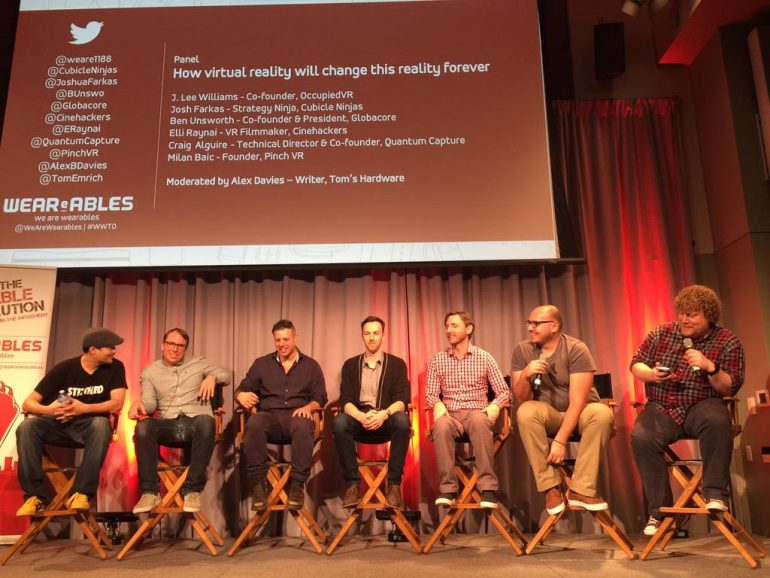For the final We Are Wearables Toronto event of the year, WWTO founder and BetaKit Senior Editor Tom Emrich ended 10 months of discussing the hottest wearables with a bang. October’s We Are Wearables was an appropriately-named Big VR event, focusing on how the emerging technology is eventually going to change the world. Featuring guests like the Toronto-based creative director of Secret Location, one of the first content agencies to win an Emmy for its VR use, it wasn’t surprising to hear that Emrich’s monthly events just reached 5,000 members.
“Are we prepared, as we build these metaverses, to create that public commons?”
“It feels like we’re in the calm before the storm right now, the same kind of feeling I was getting before the iPhone launch,” said Ben Unsworth, co-founder of Globacore, about the future of VR. “Come early next year, when the Oculus becomes actually commercially available and the Samsung Gear is out, it’s going to be a completely different ball game.”
But as VR technology becomes adopted by mainstream audiences, it’s difficult to know what kind of world will be created with such a technology. Ana Serrano, chief digital officer of the Canadian Film Centre, raised these concerns as she talked about why VR matters.
“There will be experiences where tracking biodata and eye movement will be critical to making the experience as pleasurable as possible. But we need to make sure that we don’t give VR over completely to commercial interests. “Right now we have a web that’s totally commercial,” Serrano said. “There are no spaces on the web where we can say something without fear of someone overhearing. Are we prepared, as we build these metaverses, to create that public commons? I want to ensure that it doesn’t end up living in a Matrix-like environment. And I think if we don’t design with intention, then we could fall into it accidentally.”
With a varied group of presenters across industries that will likely be hard-hit by a wave of interest in VR, some guests talked about how coming from a tech perspective, rather than a traditional film perspective, will help their companies reinvent the wheel.
“We don’t have the burden of knowledge and because we don’t have this baggage of facts to have to hold onto,” said Josh Farkas, the ‘strategy ninja’ at Cubicle Ninjas. “When people approach this from a completely fresh canvas, they can do innovative and interesting things.”
The early adopters that came from the film industry attested to the struggles of adjusting to new technologies. “As a director, it’s funny that I talk to others and some of them are like, ‘where’s the front camera?’,” said J. Lee Williams, a VFX and animation director, and co-founder of OccupiedVR. “The biggest thing they don’t understand is that it’s something totally different. And there’s so many different tools to do this and it’s part of being a director. We’ve created a new medium.”
“With VR we’re talking about healthcare, tourism, architecture, history, geography and all these cool things,” Farkas continued. “Oftentimes when people talk about VR they’re talking about narrative or games, and it limits VR to these boxes. But VR doesn’t have to end where our perceived ideas on VR end.”
So while people are on the lookout for their favourite games or movies to become immersive virtual reality experience, the panelists agreed that the technology has the potential to change more than that.
“I think anybody that has an idea and has something they wanna portray, how I see it is just as a limitless canvas, and you can do whatever you want to do,” said Milan Baic, founder of PinchVr. “If it makes sense for your story and your content, then do it. There’s no conventions.”


